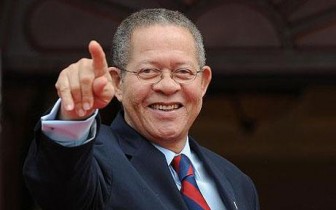(Jamaica Gleaner) Prime Minister Bruce Golding yesterday bowed to an avalanche of criticism over his stewardship of the country and appeared unmoved by a last-gasp attempt by Jamaica Labour Party (JLP) officials to rethink his intention to step aside as both head of government and party by November.
Golding confidant and JLP spokesperson Daryl Vaz told the media yesterday evening that the prime minister’s decision was final, even in the face of the party’s Central Executive’s unanimous rejection of the resignation.

Vaz, in an interview with The Gleaner hours after the announcement yesterday, however, added that the officer corps of the party would be meeting with Golding to have further discussions on the issue.
“This is not to be mixed up in relation to whether or not his position has changed. He has indicated his position to the executive today and subsequently issued a statement. Therefore, anything that happens subsequent to this is part of a process based on the party,” Vaz said.
According to Vaz, Golding’s decision to step down had been in the pipeline for some time.
“Remember that he had offered his resignation over 12 months ago and it was rejected by the party … . This is a discussion that he has had with several people inside the party.”
Golding, Jamaica’s eighth prime minister, who had been plagued by a nightmarish tenure, tendered his resignation at yesterday’s meeting of the Central Executive.
There were signs that something was amiss from last Saturday when he failed to show for a meeting where he was slated to deliver the main address to caretakers and councillors at the Jamaica Conference Centre.
Sources told The Gleaner that Golding had commissioned scholars at the University of the West Indies to a carry out a focus study. That study reportedly found that the task to regain squandered popularity would have been a Sisyphean one.
Four years after an impressive-sounding Golding was ushered to the helm of Jamaica’s political landscape, he appears to have succumbed to pressure surrounding the extradition row over gangster Christopher ‘Dudus’ Coke and his own plunging popularity against the backdrop of massive fallout from the global recession.
A statement released to the media disclosed that Golding will not be seeking re-election at the party’s annual general conference in November and will step down as prime minister as soon as a new leader is elected.
Insiders say the disclosure was made in a sombre atmosphere at the JLP’s Belmont Road, New Kingston, headquarters.
Golding stated that he had planned to lead the party into a second term of government and demit office within two years thereafter, but changed his mind.
“The challenges of the last four years have taken their toll and it was appropriate now to make way for new leadership to continue the programmes of economic recovery and transformation, while mobilising the party for victory in the next general election.”
The Central Executive, the second most powerful mechanism in the JLP after the annual conference, dispatched a statement of rejection an hour and a half after Golding announced that he planned to throw in the towel.
This is the second time in less than two years that Golding has tendered his resignation as leader of the JLP and prime minister.
Golding decided to call it a day in May 2010 after he was bombarded with calls in the midst of the Coke extradition scandal which ignited the fury of the business and civic community, as well as ordinary Jamaicans.
However, Golding, a second-generation politician, was persuaded to change his mind, and the business community relented after he apologised in a nationwide broadcast.
Accompanying the apology was an about-face in Justice Minister Dorothy Lightbourne signing the authority for extradition proceedings to commence against Coke, the then Tivoli Gardens strongman who was wanted by the United States to face gun- and drug-running charges.
The scathing verbal assault on Golding was precipitated by a belated admission in Parliament in May 2010 that he had sanctioned his party’s decision to seek the assistance of United States law firm Manatt, Phelps & Phillips to negotiate with the Barack Obama administration in the contentious extradition matter, which had dragged on for nine months.
“In hindsight, the party should have never have got involved in the way it did,” he said in the nationwide broadcast. “I must accept responsibility for it and the way it was handled and I must express my remorse. I ask for your forgiveness,” Golding told the nation.
However, the prime minister, in what appeared to be a subsequent contradictory comment, insisted that if the request had been approved, Coke’s constitutional rights would have been breached.
Renaissance
Golding returned to lead the JLP in 2005, ten years after resigning as chairman amid a dissident row. He was invited to lead the National Democratic Movement (NDM) in late 1995, pitching its mission on a promise to transform Jamaica’s political landscape by dismantling garrison politics.
The failure of the NDM to win a single seat in the December 1997 general election sent Golding scurrying from the NDM. He returned to the JLP in 2002, taking the reins of party leader three years later.
Seaga retired in 2005 to make way for Golding, whose party defeated the People’s National Party in 2007 by a narrow margin – 32-28 – but his slender political capital has gone up in smoke.




